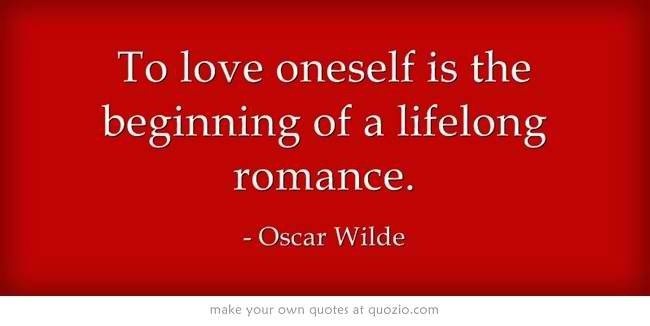During leining I like to look at the mifarshim of the Artscroll "The Chumash," which thankfully has English translations. In the week of Kedoshim (this was a while back), regarding "Love thy neighbor like yourself," the Alter of Slobadka comments that how we love ourselves without reason, so to we should love others without reason.

But today—do we really love ourselves?
I would say not. Insecurity is rampant; egos are non-existent; pretty much every obnoxious behavior is a response to the lack of self-love. Every time I come across bravado and snobbery, I conclude such acting out is an inadequate mask for the self-hate inside.

How can we love others unconditionally if we don't love ourselves unconditionally? The Alter of Slobadka spoke of it as a given; today, we actually have to work to reach the level of liking ourselves.
There is a narrow road between disliking oneself and narcissism, and one has to tread it carefully.
 There is a way to do it, to love oneself and others: Being kind.
There is a way to do it, to love oneself and others: Being kind.
Luke had a client, a little old woman who had money but no children, no nearby family; her one nephew was in Israel. When she passed away, Luke spent hours "guarding" her body in the chilly morgue; his overexcited imagination wreaked havoc with zombie fantasies. Yet it is the memory of that shmirah that constantly inspires him.
I will end up repeating this idea more than once, but ever since I heard it from Reb Tzvi Hersch Weinreb I cannot forget it.
I sought my God and my God I could not find.
I sought my soul but my soul eluded me.
I sought my brother to help him in his need, and I found all three—
My God, my soul, and thee.
The author is unknown. But his words are truer than ever before.

I don't mean one has to do chessed constantly without respite. I mean small things; smiling at everyone, from pedestrians to cashiers; holding the door for someone else; refraining from honking until absolutely necessary.
"Whatever you do, you do for yourself," means chessed as well. It is said that the only true chessed is chessed shel mes, caring for the dead.
"Whatever you do, you do for yourself," means chessed as well. It is said that the only true chessed is chessed shel mes, caring for the dead.
Luke had a client, a little old woman who had money but no children, no nearby family; her one nephew was in Israel. When she passed away, Luke spent hours "guarding" her body in the chilly morgue; his overexcited imagination wreaked havoc with zombie fantasies. Yet it is the memory of that shmirah that constantly inspires him.
I will end up repeating this idea more than once, but ever since I heard it from Reb Tzvi Hersch Weinreb I cannot forget it.
I sought my God and my God I could not find.
I sought my soul but my soul eluded me.
I sought my brother to help him in his need, and I found all three—
My God, my soul, and thee.
The author is unknown. But his words are truer than ever before.
Love is about giving. For example, you knew Leia loved Han when she agreed to wear that outfit in Return of the Jedi.
ReplyDeleteAnd on this basis most people do love themselves. They buy themselves what they want even if they can't afford it. If danger approaches they don't sit idly by but remove themselves from it.
The other danger is the difference between self-love and narcissism. It's such a fine line, eh?
I love that "poem" by Reb Tzvi. Thanks for sharing.
ReplyDeletelove the quote :)
ReplyDeleteThe concept of "love" often borrows incorrectly from the Gentile implications of that word -elaborated here:
ReplyDeletehttp://hezbos.blogspot.co.il/2011/06/love-to-give-versus-love-to-take.html
Another example of its antithetical Torah view here:
http://hezbos.blogspot.co.il/2013/03/love-at-second-sight.html
MGI: No, first Leia was masquerading as a fully-dressed bounty hunter, and then gets caught. The scandalous outfit itself she had no choice in the matter. It was a silent player in Plan B.
ReplyDeleteIf someone truly loves their child, would they spoil him? Ergo, if someone who truly loves oneself wouldn't spoil oneself either. Looking ahead for one's own retirement shows deeper care for one's future.
As for the self-love and narcissism, I mentioned it above.
Topics covered.
Beck and BB: Isn't it AMAZING? I can't stop requoting it.
I don't think this applies in every case. It's quite possible to find it easier to love someone else more than oneself. Sometimes I find it hard to love myself, but I always love my little sister. Heck, even when I'm egotistically narcissistic about myself, I still love my little sister more than me.
ReplyDeleteFG: Finally, a brother who doesn't tease mercilessly! Or do you . . .?
ReplyDelete